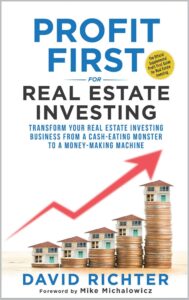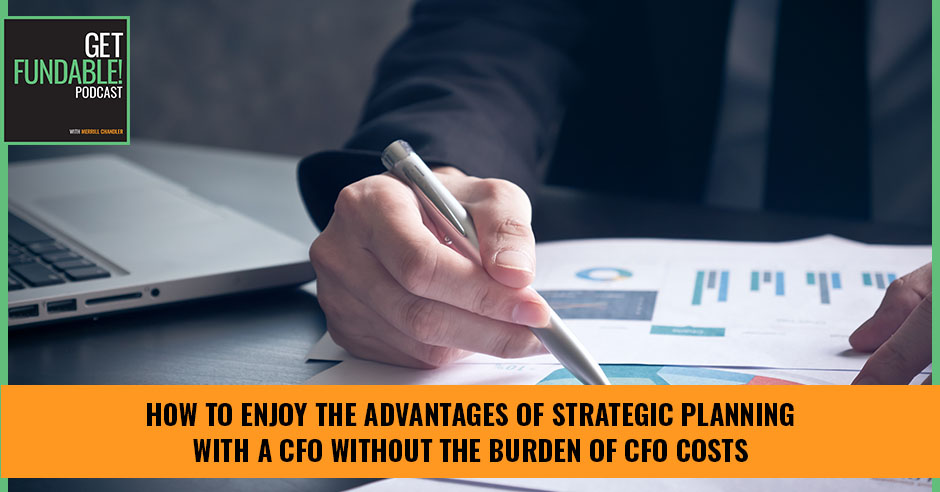You don’t have to continue living deal to deal. It is time to end the cycle, step into this episode, and enjoy the advantages of strategic planning. Today, David Richter, the founder and owner of Simple CFO Solutions, discusses how to set us up as a priority to build a quality of life without harming the business along the process. He talks about what drove him to Profit First and get out from doing deal to deal. David explains the value of putting systems in place around money. So, start turning your business into a money-making machine instead of a cash-eating monster by tuning in to this episode with David today!
—
Watch the episode here
Listen to the podcast here
How To Enjoy The Advantages Of Strategic Planning With A CFO Without The Burden Of CFO Costs
This episode is with David Richter. He is the author of Profit First for Real Estate Investing. He has got some amazing intel for us on how to make more money. He even invented the people live from paycheck to paycheck or from hand to mouth. How many of us are living from deal to deal or from close to close? No more. In this episode, we are going to be talking with David about how to set us up as a priority to build our quality of life and not harm the business in the process. I will see you on the inside.
—
In this episode, I am pleased to have David Richter. He is the author of the book Profit First for Real Estate Investing. If you’re not familiar with Profit First, you’re behind. Secondly, to level up Profit First, specifically for real estate investors, and how it intricately connects with how to use your checking accounts and financial strata and instruments to pay you first. Acknowledge you first, make you the most valuable asset of your business, and then go about your business. That’s why we have David here to share with us his insights on what to do. Welcome, David. I’m glad to have you here.
Thanks, Merrill. It’s an honor to be here.
I’m always fascinated by the essence of real estate. Eighty-plus percent of our readers are real estate investors. Give us a background of how you came to Profit First, number one. I love the book and the philosophy. Even though we’re not real estate, we do operate from Profit First philosophies here the first time we heard about that. It’s a big jump to go from Profit First to Profit First For Real Estate Investing. How did you get the juice such that he said, “Go for it. Let’s have you write that book?”

Profit First for Real Estate Investing: Transform Your Real Estate Investing Business from a Cash-Eating Monster to a Money-Making Machine
I’ve been in real estate investing myself since 2012. Along that journey, one of the stages, I was a part of a company where we grew it from about 5 deals a month to about 25 deals a month. We are doing flips and wholesale but while we were doing 25 deals a month, we were spending 26 worth out the door every single month. It’s like you make $1 million but you spend $1.1 million. I was like, “That doesn’t work.”
That was eye-opening like, “We’re doing all this activity and producing all these results but it still doesn’t matter.” Also, going to different mastermind events and hearing that we weren’t the only ones. People would stand up there saying, “We’re doing seven figures but crying at the bar later like, ‘Where’d all that money go,’” which was encouraging and discouraging. It was encouraging that we weren’t the only ones but discouraging that so many people had this issue.
It even wasn’t on my radar at that point. Before that, I thought, “You have a business. You make money. It’s great like everyone else.” I’m like, “This is a real epidemic.” A lot of people make money but feel broke. That’s where from there I started working with another investor. Some life changes happen. I moved across the country. I started working with another investor and his finances were a mess. I asked to see his numbers. I wanted to know, “How are you financially,” and it was a mess.
He didn’t have the right bookkeeper. He didn’t know real estate investing. I said, “Let’s clean this up and then move forward from here because you’ll get a lot of clarity and be able to make better decisions.” We did that. I got him clarity. Three months into it, he said, “This has been life-changing because I don’t have to guess in my business anymore. I know what I’m making, spending, and keeping. I know where my money is versus my investor’s money.”
Having that clarity in the business was the light bulb moment that started my company. That was also the catalyst since I was starting my company, Simple CFO. To give people clarity, at that point, I hadn’t even heard of Profit First. One of my mentors called me and said, “I heard you’re starting this company. You should read the book Profit First for the cashflow portion.” I did because I took action. That night, I downloaded the book and read the entire thing.
I took ten pages of notes and said, “This is a great framework for the financial side of the business for an entrepreneur.” That’s what got me in touch with Profit First. I then incorporated that on day one into my business. For any client that we worked with, we would implement the Profit First cashflow system. About ten months into it, I went to Mike Michalowicz, the original author of the original Profit First.
I said to him, “I’ve got a big real estate background. I love Profit First and I have good results with it of people losing money than having cash reserves.” He said, “Why don’t we do the book?” He gave the Okay there. It was a licensing agreement where I bought the license for Profit First For Real Estate Investing. I own that name in the book and all that. I have that and that’s mine but he signed off on it because he knew my background and then saw the results. That’s how it got connected to Profit First and then Profit First for the Real Estate Investing world.
You might’ve seen or heard it. I heard it. Notice how he slid Simply CFO in there as a little bit of this. I learned about you in the Family Mastermind from you being with Simply CFO. Tell us a little bit about that because you slid right by that one. Having somebody who is not the owner be able to review what’s going on from a different perspective has been vital for me. I’m responsible to my accounting team and CPA who play that role for me. There’s no joke when they call them the comptroller. I am beholden to them. Tell us about how you came from real estate investing but then the Simple CFO became the vehicle for your philosophy.
That was the company that I started because even before I read Profit First, I knew that there was enough market out there where people make money but feel broke. I wanted to give them clarity like I had given clarity to this first guy and he said it was life-changing. He could make better decisions and keep more of what he was making.
I felt like I wanted to start Simple CFO to be able to give that clarity. It has transformed into this big fractional CFO business where I have a team of about 40 CFOs. They’re part-time Chief Financial Officers. We put part-time financial leaders on small business teams on a lot of real estate investors because of the book that I wrote. Things come through the door but a lot of people need the help and that need that financially.
It’s someone that’s not the owner that’s accountable for being profitable in the business and that you’re running a business that pays you what you want. That’s why I started Simple CFO to give clarity but then Profit First was added to it. It snowballed into a bigger company than I thought it would because so many people out there live like that.
They either live deal to deal. They don’t have any money. They’re doing deals or getting money in the door but not keeping any of it on the backend. Where we focus is having that person not just be the rearview mirror like a lot of bookkeepers and CPAs are but being the GPS like, “Where are we going? What does the cash test?”
Instead of the rearview mirror, you’re the GPS. Where are we going? Why are we going there? How are we going to get there? I’m fascinated because the CFO position in any organization, fractional, full-time, or otherwise is in charge of the strategy. What I’m hearing you say is the rearview mirror people are accounting for the mess that happened but not planning in the future for how to make strategic decisions about tax, income, cashflow, and revenue. Am I reading this right?
Yes. At the beginning when I first started this, we had an internal bookkeeping arm. We would give people bookkeepers because they always come with a mess. “I have no books. I have messy books.” I thought bookkeeping was the answer and then I realized that I was giving that person a loaded gun. They have no idea how to aim, load it, or do anything in the future with it. How do I direct that bookkeeper like the owner is? I’m giving them a bigger problem just by giving them a bookkeeper because they don’t know the financial department.
It’s not the part that usually gets taught. Operations, sales, and marketing, a lot of that gets taught in masterminds or events but the financial part never gets hit on. There’s no guidance there. That’s why I’m like, “At this point, we only give a financial leader to manage the bookkeeping side and the CPA but then also to help the owner and guide them. Also, give them clarity on where they stand cash-wise and where the projections are. Do we need to hire someone? How much can we pay them?”
It’s different things like that that the owner cares about like, “Is the owner paying themselves anything or are they living on fumes at this point?” That’s where I knew that the bookkeeping and the CPA are great rearview mirror stuff but they need a leader to take charge and say, “Here’s where you’re going to end up. If you keep making the decisions you’re making, you’re either going to go out of business or you’re not going to be where you want to be.”
If you keep making the decisions, you will either go out of business or not go where you want to. Share on XYou may have heard this but I’m going to put an exclamation point on it. Living deal to deal because what we don’t acknowledge is, “I’m a business owner. I’m an entrepreneur. I don’t live paycheck to paycheck or hand to mouth.” Those are the other terms that we shy away from or we’re like, “I’m a business owner so that doesn’t apply to me.” However, living deal to deal, are you kidding me?
That could be close to close, depending on what your business is. Your cashflowing based on your next sale. Go more into that. What are some of the landmines or the key mistakes people make when it comes to living deal to deal? I used to operate from that until I got the help that I needed. I’m standing up there like, “My name’s Merrill Chandler and I’m a notorious deal-to-deal addict.”
The problem that I see there is, unfortunately, it’s the human condition. It’s something that we all have inside of us that we think that more income solves all problems. That as long as we make more, all the money problems will go away. However, if we don’t learn at the root that it’s, “Yes. We need to make as much as we can but then we need to keep at least some of it so we’re not living deal to deal, sale to sale, month to month, paycheck to paycheck,” or however you want to say that.
It’s that where we have to know that it’s not about that next deal or more income. It’s about the income that we have and how we utilize it to make sure that we’re not living deal to deal. That’s going out and seeing that the marketplace is full of people that live like this but there’s been no help. No one’s taught us this. The other big issue that we have is that we grow up.
How many parents out there said, “Money doesn’t grow on trees? No, you can’t have that.” It’s all these bad money mindsets around money or maybe it was other things in your life that pointed you away that gave you bad money mindsets but then you don’t get any help. You then become the business owner and you think, “Yes, I’m the business owner. Everything’s going to be different. We’re going to make all this money.” It’s then the same thing. You’re living deal to deal and everyone else is too. They don’t give you like, “How do I get out of this?”
There are books out there like Rich Dad Poor Dad or The Richest Man in Babylon. They even say, “Pay yourself first or the portion of all you have is yours to keep,” but to a lot of entrepreneurs, those are just words. That’s what drove me to Profit First because it gives a formula. It gives something very similar to what they say in Rich Dad Poor Dad but then there’s a system behind it to make it a reality so that way you don’t have to live deal to deal anymore and you can take more of what you’re making.
If you are already doing any amount of volume in real estate, you could probably be taking more or at least keeping more but a lot of people don’t have that clarity. What could I keep without hurting the business so I could still reinvest and pay myself? Have clarity around that. Where a lot of people break down is that they’ve never been taught that and they think that income solves all the problems.

Strategic Planning: Many people break down because no one taught them how to have that clarity around money. They think that income is solved all the time.
You nailed it. It’s the money mindset. The message I received was you have a champagne taste and a beer budget. You can buy beer but that champagne is probably outside of your reach. That was one of the things that I’ve had to overcome. As a business owner, I’m typical. It’s exactly what you’re talking about. I start saying, “I’m making more money than I’ve ever made,” but I would then not pay myself first.
I would invest in sometimes spurious things like, “What about this?” The best salespeople are also the best sold. That was me. I’m like, “Yes to that.” It was not having a strategic movement forward. It was more haphazard. More is better was my framework. I know it’s a human condition. In this episode, we’re solving world hunger as well.
If more people had more money in their accounts, those businesses could give to those different causes. If they were non-profits, how do we make sure that every dollar’s being used appropriately? Yes, we could solve a lot of problems by helping.
It’s by keeping more money.
Also, having a system in place to do the things you want to do with your business.
What was 1 or 2 of the things you grew up with? The stinking thinking, the limiting beliefs, or those fixed beliefs that kept you in the way. I’m stoic through and through. The most stoicism book that’s out there is called The Obstacle Is the Way. The thing that’s in front of you and the thing that’s killing your tribe is the thing that will save you because overcoming it is the very set of muscles that you need to level up. What got us here won’t get us there. We need a new set of business muscles.
They would get mad at us because our mindset is my quality of life. Just so you know, David, we focus on quality of life. “How do I choose me this week, this month, or this quarter?” I was so happy to have met you in the Profit First for Real Estate Investing. I didn’t bring on a Profit First person because it’s just Profit First and it could apply but when I heard that you wrote your book, I was like, “We’re all in on this.” Where did you come from such that the obstacle was the way for you?
Growing up, I had good parents but they had a middle-class mindset. It was more of the “Money doesn’t grow on trees,” and that type of stuff. A lot of the things I put in my presentation are because they’ve resonated with me and that it applies to so many different people. Becoming a business owner and understanding the real estate world, it was also sitting there like, “Even though we’ve grown to 25 deals a month, that didn’t matter that we were doing more deals.”
We have 300 deals a year with almost a deal a day. It was like, “That didn’t help us.” It wasn’t that income that solved all the problems. I’m more of a saver than a spender. If anything, because it doesn’t matter which side of that fence you’re on, Profit First helps one or the other. It gave me a system to know, “Here’s the money I could spend,” and not be a miser but still be able to invest in the business, do the things that I wanted to do, and not be scared and live in that scarcity mentality.
On the other side, if you’re a bigger spender than a saver, it helps you to say, “Here’s what you can spend but then you need to also pay yourself and make sure you’re saving some money for taxes and your profit so you don’t go out of business too.” It helps both sides of that fence where I’m more on the saver side and it helped me to like, “I can spend this money.” There’s a big percentage that should be invested in the business. It’s like, “Here are the percentages that I need to save in what I want for the business and the health of the company.” It gave me that framework. That’s where I came from personally.
You triggered that thought in me. You call yourself a saver and there’s down to miserly and stingy like a $1 tip on a $100 meal. The system says that I can be prudent. “I have a system so I can be prudent in my expenses, not just prudent in my savings.” Is that what I’m hearing you say?
Whether you love or hate Dave Ramsey, with his personal finances and what he says, I love when he says, “Give every dollar a name.” When he does the budgeting software, systems, and all that like the Envelope Method, which Profit First is based a lot on the Envelope Method, that’s where I want you to give every dollar a name so that way, you know, this is for the expenses and to grow the business and invest in marketing but then there are dollars out there named for savings as well too, whether it’s for your profit to pay yourself or the taxes.
Give every dollar a name. Share on XIt’s a system that helps you be prudent on both sides of the fence. If you were in your personal finances, one side weighed heavier than the other. I even talk about it in my book. My wife and I would have fights early on in our marriage because I’m a saver and she’s a spender. I thought I was right and she was wrong but do you know what it was? It was the lack of systems that we had in place for our money to be able to say, “Here’s what we have to spend. Here’s what we have to save.”
It was like, “Thank God that there’s a system that makes it simple.” That’s why I like Profit First for the business side because it makes it simple for the entrepreneur based on percentages and bank accounts. It’s those types of things. That’s where, for me, it hit home in lots of areas of my life and helped me personally and professionally to have that clarity around the money.
You might enjoy this story but I’ve never told this to my tribe, which I don’t even know why because illustrates perfectly what you’re saying. One of the things I knew I had arrived in a new mental mindset is that I love movies. I’ll go to a movie at the 11:00 AM showing and go until 11:00 PM. I’ll watch 5, 6, or 7 of these back-to-back. I love it. It is a thing for me. I don’t have an addictive personality. I have a compulsive personality. It’s all in. I then won’t see a movie for two months. I would go to the movies and then go from theater to theater behind because I was behind the pinball as we call it.
I’d plan out my whole day and then I would go out and say, “Remember me?” I’d buy food and then come back in. I knew something shifted in me when I could pay for every single movie that I watched. That’s so subtle but cheating versus standing for being able to pay for what you receive was massive for me. What was one of the key moments, a-has, or that thing where you went, “This is it?”
It may be something you already shared. I know I’m successful when I create a-has in my tribe that they engage us. They buy something and do something with us. They read the book or whatever it is. That’s how I know I’m successful. What was one of the a-has that you had similar to this thing? When did you arrive? What was one of those milestones where you’re like, “I made it?”
One of them was when we had so many people wanting to be clients up front where I’m like, “This is resonating with people. A lot of people must be in here.” There was one of the very first clients we worked with and I still use his story all the time because in 2019 right when I was getting started, we went to the same mastermind.
I won’t tell his whole story but he was crying up in front of a mastermind because he had lost $70,000 that year as a fix and flipper. He had a few rentals but was robbing Peter to pay Paul and playing the Money Shuffle game. Through working with him and him taking the Profit First, leaning into it hard, setting up the accounts, following the system, telling his money where to go, and playing the game right, the money came right.
For the next three years, I went back to his CPA. He had money to pay his taxes but also money to pay himself. He had the money to be able to do the things he wanted to do. In Profit First, we teach about different types of accounts to set up. One of them is a profit account and one of them is an owner’s comp account. He had filled up his owner’s comp and owner’s pay so he could pay himself. He had never paid himself from the fix and flip company before.
His wife in 2019 worked with him. They were trying to scale together. She was having seizures because it was so stressful during that year. It was one of the craziest stories but then probably the biggest moment that impacted me was when he texted me at the end of 2022. We had been talking about his big purposes in life, which are to spend time with his family and then give to charity.
Through Profit First, he had reached some of those milestones. He took three weeks off, went RV-ing with his whole family, and did stuff like that. That was fun but then the big kicker and the thing that opened my eyes where I had to get this message out more was when he texted me, “There’s this camp for kids. I know we’ve been talking about it. I want to give towards this charitable cause.”
He texted me at the beginning of 2023, “I was able to give over $70,000 to this camp for kids.” He sent me the amount in a text message. I’m like, “This is awesome.” I picked up the phone right away and said, “Joey, do you understand how significant that number is?” He’s like, “I know it’s a lot.” I said, “Do you remember how much you lost in 2019?” He is like, “This is incredible. Tell everyone.” The difference is in 2022, he was able to give $70,000 from one account to a camp for kids to help to achieve his life’s purpose and his goals.
He still didn’t touch what he needed to run his business. He had the other account set up. It’s what Profit First teaches. He had the money still to pay himself but that’s where I saw the fruits of the labor if you get it implanted early, the earlier the better because it gets better every year. You’re getting the habits in and then you’re being able to compound it. You get the money in.

Strategic Planning: The earlier you plant the fruits of labor, the better because it gets better every year.
Do you want to grow? Where are you in your stage of business? The more you’re into this type of system and you know where the money’s going, you can affect it. Is it growing and scaling? You do but you want to do it profitably. Do you want to spend more time with family? Is it traveling the world? Is it being able to give to charitable causes instead of running on fumes?
You are a slave to your business and that to me was one of the biggest life-changing moments. I see other people like that where they were worried at tax time every single year. Now, they have an account dedicated to tax and don’t have to worry about that anymore. They can focus on working on the business and growing it. I have story after story like that but he resonates the most because of the radical change he came from losing money to giving.
Also, the $70,000 on each of the goal posts. That was amazing. I got chills when you said it. It was $70,000. That’s how we teach ourselves. It’s got to be the same number.
He wasn’t even conscientious of it. It made a huge impact on me. He was glad he was able to do it. I’m like, “Do you realize this number?” For him, he wanted to block out 2019. It was a bad year. I got where he was coming from but once he saw that, he was over the moon.
What are the key pieces for somebody who would implement Profit First? What are the building blocks of Profit First so our readers can go, “I can do that?”
At the end here, I’ll give you a cheat sheet so they can go and get that. It’s easy to follow step-by-step. Sometimes it’s too much on a show so I’m going to give you a very high-level overview. The cheat sheet gives you the nitty-gritty. 1) Find what you need from your business. Build your business around you versus being a slave to your business as Merrill was saying.
I want you to know, “I need X amount of dollars every month to go into my personal bank account from the business for me not to feel like I’m living deal to deal anymore.” To feel like, “The business is paying for me and my lifestyle and where I am. Also, make sure that it can cover me getting out of the rat race.” Get that and keep the number first. What I need to keep is number one. If you get the cheat sheet, it goes into, “How do I find the keep number,” and here’s a video.
2) Set up the actual Profit First system. It’s based on the Envelope Method so it’s setting up business checking bank accounts that are named different things. I’ll tell you the first three that I would set up no matter what your business is. It could be real estate or if you’re a restaurant. It doesn’t matter. The first three are fundamental because they’re the golden trio. These three help you keep more of what you’re making.
If you have a hard time saving money or building a reserve, these three will help you do that. 1) Profit. 2) Owner’s comp. 3) Owner’s tax. Owner’s comp is what you pay yourself consistently on a monthly, weekly, or biweekly basis. Owner’s tax is making sure you have the taxes at tax time. A little part of every single sale that happens goes into that tax bucket. Profit is the icing on the cake.
For Joey, that’s where he was able to give the $70,000. He set up a giving account but part of the profit would go into that giving account every quarter. Why did you start your business? That’s the profit account. It’s that fuel for your fire. It’s not just good enough to know what you need and then to set up the accounts. 3) You have to build wealth habits. On a consistent basis, you have to transfer money from the income account and you’ll see on the cheat sheet how it’s all set up.
There’s even a visual overview but it goes from one account to all those different accounts so you can see by percentage how much you have in each bucket that way it’s very clear. You then do it consistently. I say do it once a week on Friday. On Friday, make sure that no money’s left in that one account and it’s spread out over all the different accounts. That way, you have been a good steward of your money and you are controlling your finances.
Monthly, you would review the money because you’ve got it separated into different accounts so you can see how much we have that we’ve kept. How much went out in OpEx and how much came in the door? That would be another. Also, quarterly take the money. It’s having those habits in your business. 1) Find that keep number. 2) Set up the actual system. 3) Build the wealth habits that keep the system going. I don’t want you to be one of the people who says, “I listened to you. I set up an account but I never did anything with it.” I want you to do something with it.
Build the wealth habits that keep the system going. Share on XI’ve also had people say, “I’ve set up one account and transferred 15% of everything I do.” I’m like, “That’s great. Start with where you can.” If it’s too daunting to go into the full system, then you might need help. That’s what Simple CFO is for. However, if you’re like, “What’s the first step I could take,” you’ll at least get that cheat sheet with, “Here are the first steps. Here are the accounts to open up. Here’s why to open them up.” Dive into it deeper so you can at least get up and running with a financial system in your business.
Ladies and gentlemen, I rest my case. This is why I’ve had David join us because every single one of us, we are about getting money. The vast majority of us are slaying the money acquisition process. We’re leveraging that money. I was told a long time ago that you’ve got a faucet and a drain. If the drain is bigger than the faucet, we are not going to ever accumulate anything.
We want a bathtub full of dollars in these accounts specifically for your quality of life, the taxes, paying the partner we call Uncle Sam and making sure that you have the peace of mind that you need. David, this has been brilliant. Do you want to say anything to the folks who are reading? Give us the downloads and your URL. How do they get ahold of you?
If you want that cheat sheet, which has the Profit First overview, I also give my full eBook and audiobook there. If you want the print copy, you have to go to Amazon but if you want Profit First for Real Estate Investing and diving in, it’s a part of that cheat sheet. There’s a link on there too. It has a folder that has that eBook and audiobook.
Go to SimpleCFO.com/Gift. If you go there, you can download all that stuff. I made the cheat sheet as easy as possible. It’s one page. It’s got some links in it to watch some videos if you want to get a more explanation and it’s got a visual overview of the Profit First system. If you go there and you’re like, “That made sense and I heard him talking but how do I visualize it,” it’s got the visual overview, plus you can get the book and the cheat sheet there.
From there too, if you were like, “Simple CFO sounds awesome. I need someone in my life that will help me be accountable to the profit of my company,” then there’s a page right after that where it goes to if you want to schedule a call with our team. There is no obligation whatsoever. We tell you what we do. If we’re not a good fit, we’ll ping you to someone who’s a good real estate investing specialist in the financial world or whatever background you’re in.
On behalf of my readers, and we have over 60,000, thank you. Many people read this show because we’re a unique collection of crazies. We believe that we can awaken from the financial matrix and play the real game of life. That starts with the quality of life. You have been instrumental in giving us tools and actual systems that will allow my crew to be able to prosper further.
For every one of you reading or otherwise, go to SimpleCFO.com/Gift. Commit to me that you’ll download it and look at it at a minimum. I want you to do more but I always give you a threshold of performance to make sure that you do something bigger and bolder than you did yesterday. David, thank you so much. This was brilliant. You have a spectacular rest of your day.
Important Links
- Profit First for Real Estate Investing
- Profit First
- Simple CFO
- Rich Dad Poor Dad
- The Richest Man in Babylon
- The Obstacle Is the Way
- Amazon – Profit First for Real Estate Investing
- SimpleCFO.com/Gift
- https://www.Facebook.com/TheSimpleCFO
About David Richter
 David Richter is an active real estate investor who has been essential in closing over 850 deals over the last 10 years. He has experience with wholesale, turnkey, BRRRR, owner finance, rentals, lease options, and any other exit strategy you can think of.
David Richter is an active real estate investor who has been essential in closing over 850 deals over the last 10 years. He has experience with wholesale, turnkey, BRRRR, owner finance, rentals, lease options, and any other exit strategy you can think of.
While growing and building a real estate business from 5 to over 25 deals a month, he realized that as much money was coming in, it was all going right out the door. With the unique opportunity of being in every seat as a real estate investor, he found a calling in the company’s finance seat to help businesses see where their money really went.
David has helped real estate companies completely turn around from going out of business to building cash reserves by using the Profit First cash flow system. He has been featured on Biggerpockets, Real Estate Disruptors with Steve Trang, and many other podcasts, shows, and stages.
To help even more people, he wrote Profit First for Real Estate Investing – a derivative of the original Profit First by Mike Michalowicz that is tailored specifically to Real Estate Investors. His goal is to completely transform the Real Estate Investing industry by helping real estate investors make and KEEP more money in their businesses. As the founder and owner of SimpleCFO Solutions, he wants to bring investors true financial clarity and freedom and help every investor stop living deal to deal.





